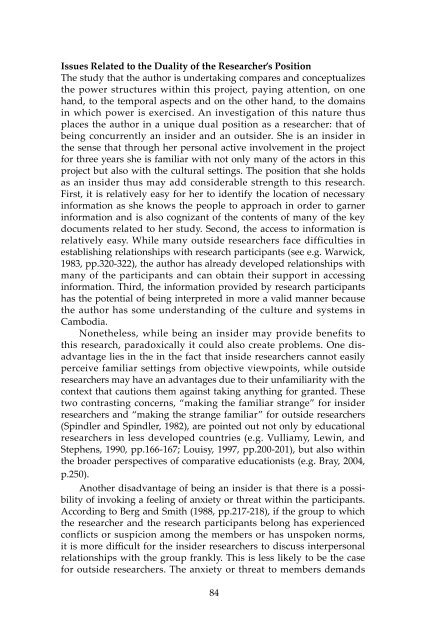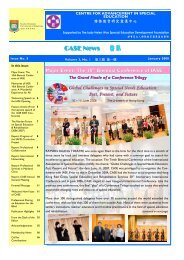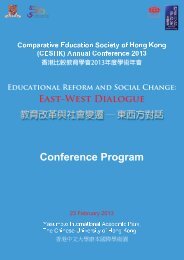Comparative Education Bulletin - Faculty of Education - The ...
Comparative Education Bulletin - Faculty of Education - The ...
Comparative Education Bulletin - Faculty of Education - The ...
Create successful ePaper yourself
Turn your PDF publications into a flip-book with our unique Google optimized e-Paper software.
Issues Related to the Duality <strong>of</strong> the Researcher’s Position<br />
<strong>The</strong> study that the author is undertaking compares and conceptualizes<br />
the power structures within this project, paying attention, on one<br />
hand, to the temporal aspects and on the other hand, to the domains<br />
in which power is exercised. An investigation <strong>of</strong> this nature thus<br />
places the author in a unique dual position as a researcher: that <strong>of</strong><br />
being concurrently an insider and an outsider. She is an insider in<br />
the sense that through her personal active involvement in the project<br />
for three years she is familiar with not only many <strong>of</strong> the actors in this<br />
project but also with the cultural settings. <strong>The</strong> position that she holds<br />
as an insider thus may add considerable strength to this research.<br />
First, it is relatively easy for her to identify the location <strong>of</strong> necessary<br />
information as she knows the people to approach in order to garner<br />
information and is also cognizant <strong>of</strong> the contents <strong>of</strong> many <strong>of</strong> the key<br />
documents related to her study. Second, the access to information is<br />
relatively easy. While many outside researchers face difficulties in<br />
establishing relationships with research participants (see e.g. Warwick,<br />
1983, pp.320-322), the author has already developed relationships with<br />
many <strong>of</strong> the participants and can obtain their support in accessing<br />
information. Third, the information provided by research participants<br />
has the potential <strong>of</strong> being interpreted in more a valid manner because<br />
the author has some understanding <strong>of</strong> the culture and systems in<br />
Cambodia.<br />
Nonetheless, while being an insider may provide benefits to<br />
this research, paradoxically it could also create problems. One disadvantage<br />
lies in the in the fact that inside researchers cannot easily<br />
perceive familiar settings from objective viewpoints, while outside<br />
researchers may have an advantages due to their unfamiliarity with the<br />
context that cautions them against taking anything for granted. <strong>The</strong>se<br />
two contrasting concerns, “making the familiar strange” for insider<br />
researchers and “making the strange familiar” for outside researchers<br />
(Spindler and Spindler, 1982), are pointed out not only by educational<br />
researchers in less developed countries (e.g. Vulliamy, Lewin, and<br />
Stephens, 1990, pp.166-167; Louisy, 1997, pp.200-201), but also within<br />
the broader perspectives <strong>of</strong> comparative educationists (e.g. Bray, 2004,<br />
p.250).<br />
Another disadvantage <strong>of</strong> being an insider is that there is a possibility<br />
<strong>of</strong> invoking a feeling <strong>of</strong> anxiety or threat within the participants.<br />
According to Berg and Smith (1988, pp.217-218), if the group to which<br />
the researcher and the research participants belong has experienced<br />
conflicts or suspicion among the members or has unspoken norms,<br />
it is more difficult for the insider researchers to discuss interpersonal<br />
relationships with the group frankly. This is less likely to be the case<br />
for outside researchers. <strong>The</strong> anxiety or threat to members demands<br />
84
















